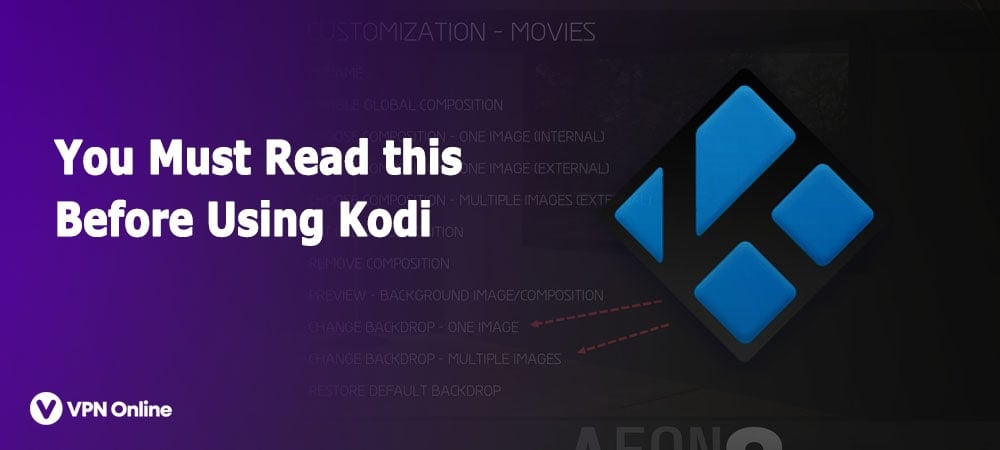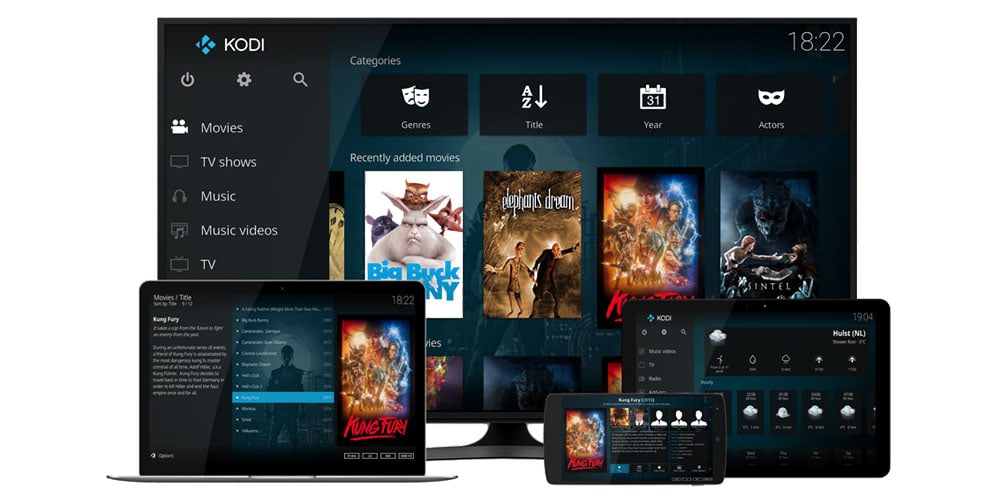
What is Kodi? Kodi, the multi-platform home theater software formerly called XBMC, can be customized with a range of content repositories, tools, Kodi app, Kodi wiki and programs for a tailored entertainment experience. It overlays any computer, Android device, and even Raspberry Pis with an easy-to-use interface compatible with remote controls and gamepads.
Kodi add-ons, the modules used to extend XBMC’s capabilities, can stream video and music from legal sources like Netflix or from illegal torrents. Streaming on Kodi comes with all the same obstacles and risks as if watching on a web browser, however. Netflix users outside the United States will still have a more limited selection of shows and movies. Those streaming from torrents and unsanctioned websites could get in trouble.
A good VPN will make all internet traffic from a device to go through VPN server. Although, it is possible to use VPN only for Kodi traffic (VPN split-tunneling) a whole system VPN is much easier to setup and common at this point.
There are Kodi movie addons, Kodi TV addons and other plugins that enable you to enhance your Kodi features. At this point, however, there are only very few addons that install Kodi VPN feature.
This streamer does not have any limitations as to what it can broadcast, providing exceptional flexibility to those who wish to give it a go. However, in order to unblock geographically restricted content and at the same time secure your connection to the Internet, a VPN should be put into effect.
Do you use Kodi and wonder why you might need a Kodi VPN service? In this post, I will give you three good reasons why you should use a VPN for Kodi on your streaming TV box, PC or stick.
If you are using unofficial Kodi add-ons to stream TV shows and movies for free, I really recommend you use a VPN. Don’t let your ISP (Internet Service Provider) see and track everything you’re streaming and from where. A VPN will encrypt all of your data in and out of your Kodi box or even your entire home (see below about DD-WRT routers).
It also passes your data through a VPN server anywhere in the world… you can choose. This makes your ISP’s peering eyes blind to the contents and source of your Internet traffic. With ISPs sending letters to people who watch pirated content, this reason is becoming more important than ever.
The other side of the coin is being able to browse, download, and stream anonymously. Not only is your ISP blind to your traffic, but the server you download from is blind to who you are and where you’re from. Your IP address can’t be tracked by the servers you’re downloading from since the servers just see the VPN server that the traffic is routing through.
Some Kodi streaming servers may be geo-blocking, meaning they are only going to serve streams to users in a certain set of countries. With a VPN, you can choose a server in the country of your choice, and then those servers will think you are from there, and they will serve the content accordingly.

Kodi, on its own, does not pose any threats. The apps you will find in their official repositories are safe for anyone to use.
However, when you use Kodi with third-party add-ons, you could be putting yourself at tremendous risk. Some of these add-ons come with malware or spyware that might harm your device.
Unfortunately, there is very little the staff at XBMC can do about it. A considerable number of those that work at Kodi are volunteers, and to be honest, they are doing a good job. In addition, Kodi is an open-source project which means anyone can come in.
Therefore, you need to do the job of protecting yourself when you use Kodi, especially with third-party add-ons. To do that, you can get a VPN which is a virtual private network to protect you and your device.
As a law-abiding citizen, it is normal for you to ask, "is Kodi legal in the US?" To answer your question, Kodi is a tool just like your laptop, screwdriver, or phone. As a tool, Kodi only helps you perform tasks.
As a result, Kodi is legal as long as you use the application for the proper purposes. At the initial stage, when you install Kodi, it comes with no contents or third-party add-ons.
All it does is help you stream online content and organize your local content on your local network or device. The tool also enables you to add descriptions, covers, and posts related to your content by scanning them.
However, the problem with Kodi comes when you start installing third-party add-ons on the platform. Many users turn to Kodi because they want an easy alternative to view content that is not readily available on other platforms.
Unfortunately, some of the content that they seek is not offered by the stock version of Kodi itself. To get access to this restricted content, many users take to third-party addons. Most times, these third-party add-ons stream content from sources that are not sanctioned by the copyright holders.
The add-ons get their content from pirate IPTVs, torrents, and other unlicensed websites. For the sake of clarity, using add-ons to stream copyrighted content without permission is illegal in the United States. If you are caught doing so, you could be in serious problems. That explains why XBMC dissociates itself from all third-party add-ons.
Here are some practical steps on how to use a VPN on Kodi on any device.
Another alternative is to use a third-party VPN Kodi add-on. The only issue with this alternative is, not all VPN providers have their add-ons in the Kodi store. Therefore, you might not find the VPN service you are looking for with this alternative. But then, if you find the service you want, follow these steps.
Some devices, however, do not support VPNs. For instance, if you intend to use Kodi on a console, you already know consoles do not support VPNs. For such devices, you might consider setting up the VPN on a Wi-Fi router.
You can do that using your laptop to set up a virtual router or manually configure the VPN on a physical router. If the physical router does not support VPNs, you might have to flash new firmware into it.
Kodi is a popular streaming tool used across the world because of its functionality and the fact that it allows add-ons. However, this factor also makes Kodi very vulnerable to attacks from hackers that want to plant malware into your system.
To avoid issues, you can protect yourself by following these tips:

No, you don’t necessarily need a VPN to enjoy Kodi. Kodi is a streaming application that is legal to use. It's like using Netflix, YouTube, etc. If most of the content you consume on Kodi is locally hosted either on your device or your network, you might not need a VPN to use the app.
However, if you use Kodi without a VPN, it comes with the following limitations:
The good thing about Kodi is that it works efficiently with most VPNs that you have online today. If you can get yourself a good VPN, it should support most Windows PC, macOS, Amazon Fire TV Stick, Android, iOS, and even Linux.
If you have issues with Linux, you could try its open-source Open VPN app, which you can configure manually. Generally speaking, for you to use a VPN for Kodi, it should meet the following conditions:
As said before, VPN on Kodi serves mainly two purposes: helps you access geo-blocked content and protects your online identity, in case you are concerned about it. Traditionally, it has been suggested to use VPN mainly with services such as torrents or Usenet, because these services involve being connected with many computers, and thus might pose a security risk.
With growing streaming add-ons with content from legally question sources, VPN usage on Kodi growing exponentially because of their Kodi media center too. So if you stream live content, movies, TV shows, and other videos on your Kodi box, the chances are you could benefit from a reliable VPN service.
This is a huge issue for those using mainstream paid streaming services like Netflix, Hulu, Amazon, etc. They are notorious for having a ton of their content geo-blocked to allow for only certain countries due to all the partnership they have and all the agreements they must abide by.
Fortunately for you, using a VPN is a great way to get around that. Netflix and Hulu have wised up to the VPN workarounds and have started detecting the use of VPNs and blocking them.
